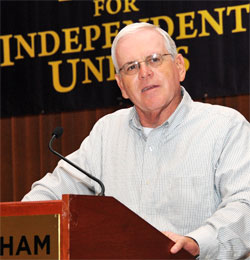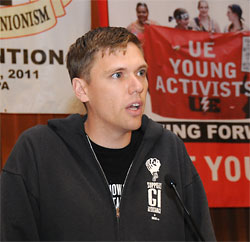
|
| Secretary-Treasurer Bruce Klipple reports on UE's finances. |

|
| Aaron Hughes of Iraq Veterans Against the War delivered an enlightening and moving speech to the delegates. |
The UE Convention session of Wednesday morning, September 28 got underway with President John Hovis again calling representatives of the Resolutions Committee to the platform. Matt McCracken, Local 506, read the resolution, "Peace, Jobs and a Pro-Worker Foreign Policy."
David Betsworth, Local 893, stood "in full support" of the resolution, adding, "It takes a lot of courage to say the things said in this document." Ray Greenwood, Local 170, proposed an amendment to strengthen the language on the Israeli-Palestinian conflict. The amendment, adopted without opposition, calls for an end to U.S. military aid to Israel, an end to the blockade of Gaza, removal of Israeli settlements from Palestinian territory, and recognition of Palestine as a state with East Jerusalem as its capital.
Carl Rosen, Western Region president, encouraged locals to get involved in the "move the money" campaign to shift spending from the military to domestic needs. He also invited UE members to come to Chicago in May to join protests at the summit of the G8 and NATO. James Brooker, Local 150, also expressed strong support for the resolution, which the delegates then unanimously approved.
President Hovis then introduced guest speaker Aaron Hughes of the Iraq Veterans Against the War (IVAW).
Hughes started with some of the grim statistics about the situation of veterans. Currently 21.9 percent of Iraq and Afghanistan war veterans are unemployed, 12 percent more than the overall unemployment rate. For African American vets of these wars, the jobless rate is 30 percent. "As I stand here, over 80,000 veterans sleep homeless on any given night, while over 136,000 veterans spent at least one night in a homeless shelter in 2009."
Between 20 and 50 percent of service members deployed to Iraq and Afghanistan have suffered post-traumatic stress disorder (PTSD), which translates to 350,000 to 900,000 current GIs and recent veterans. A major cause is redeployments: by 2008 nearly 33 percent of all troops have served two tours in Iraq and/or Afghanistan, 10 percent have served three tours, and more than 11,000 have served six or more tours. "Almost 30 percent of service members on their third tour suffer from serious mental health problems," said Hughes. As a result, the suicide rate among active-duty military is double that of the civilian population. Military suicides increased 150 percent from 2001 to 2009.
Hughes described the situation at Ft. Hood, with the highest suicide rate of any army post, and 21 acknowledged suicides last year alone. Ft. Hood psychological counselors meet with 4,000 patients a month. "The services are overwhelmed," and in 2009 7,000 Ft. Hood soldiers were on anti-depressants. As of last fall, there was only one social worker at Ft. Hood to handle cases of military sexual trauma.
The bleak situation facing GIs and veterans shows that "'Support the Troops' is a lie," said Hughes. He recounted his personal experiences as a cargo driver in Iraq, deployed in 2003, driving a truck that had been used in the Korean War. He was ordered not to stop or slow down when children, desperate for food, attempt to jump onto the vehicle. Soldiers are taught to refer to Iraqis as "hajis" as a way to racialize and dehumanize them.
The political goals of IVAW are to withdraw U.S. troops, pay reparations for the damage done to Iraq, and fully pay benefits and healthcare to veterans. "We're building a movement," Hughes said, and organizing among active-duty service members. IVAW has learned to organize by studying the labor movement and the civil rights movement. The antiwar movement in the U.S. "is not deep enough," he said. "We have to reach out to our own communities. The key is working together."
At the conclusion of Hughes' moving talk, delegates gave him a standing ovation.
POLITICAL ACTION
Resolutions Committee co-convener Cleo Hester introduced committee members Matt McCracken, Local 506, and Ali Goguen, Local 255, to read the resolution, "Stop the War on Working People: Independent Rank-and-File Political Action." Delegates then viewed a video, prepared by Eastern Region President Andrew Dinkelaker, on UE's 2010 Political Action Conference in Washington.
President Hovis then called on Political Action Director Chris Townsend to report. He faulted Democrats for their insufficient response to the economic crisis, and their crafting of a "mind-boggling incomprehensible healthcare bill that confused and demoralized just about everyone, including me." The Democrats squandered the mandate they received from voters in the 2006 and 2008 elections, leading straight to their "disastrous losses" in November 2010. The crop of extremist Republicans ushered into power in that election have been attacking labor in all 50 state capitols as well as Washington, Townsend said. But UE and much of labor have been fighting back, and the battles ahead include the ballot referendum in Ohio to repeal union-busting Senate Bill 5, the planned campaign in Wisconsin to recall Gov. Scott Walker, and upcoming battles in Iowa to maintain existing worker rights.
"What does the future hold," Townsend asked. He gained some insight into that question -- at least into what the corporations have in mind -- by being around GE officials and listening to them during negotiations earlier this year. "GE is the most emulated, respected company in corporate America," said Townsend; politicians fawn over high-ranking GE executives, and nearly every corporate CEO would love to be in the shoes of Jeff Immelt, GE's chief executive. Despite having closed 31 plants in the past three years, Immelt was named head of President Obama's "Jobs and Competitiveness Council." GE paid no federal income tax last year, and has immense influence in Congress. GE's vision of the future, said Townsend, is what it calls "the competitive wage." They see workers working for a top wage of $13 an hour (but starting at much lower wages), with no union, no pension, and largely paying for their own healthcare with high-deductible plans. He expects some version of this to be rolled out by the Immelt-chaired "jobs council" and warmly received by many in Congress. "The competitive wage is their plan for us. Corporate America is driving this." But we can counter attack, we can go on the offensive, said Townsend. "We're in a fight to the finish. History has picked us. We need to tell them, 'Go to hell with your competitive wage!'" Delegates gave Townsend a standing ovation.
Kari Thompson, Local 896, thanked the resolutions committee, Chris Townsend, and the workers of Wisconsin. Iowa faces a critical special election to fill the seat of a Democratic state senator who quit to take a job with the Republican governor. On the line is anti-union legislation that was narrowly defeated earlier this year. Charlene Winchell, Local 1121, thanked everyone for their support for the Wisconsin struggle. In her La Crosse-area state senate district, she said, opponents of Republican Senator Dan "Hanky" Kapanke gathered 30,000 signatures in 30 days (the law required just 16,000 in 90 days) on the recall petition, and Kapanke was voted out in the recall election. The next battle in Wisconsin is the recall of Gov. Walker, and Winchell said, "I won't stop until that a--hole is out of office." Becky Dawes, Local 893, also spoke in favor or the resolution, which was unanimously approved.
The resolution "Retirement Security: The Fight to Defend Social Security, Pensions and Medicare" was read by Resolutions Committee members Matt McCracken and Ali Goguen. The erosion of retirement security, said Tom Gharing of Local 622, means that older workers stay on the job, increasing unemployment among young workers. "We need to support this," said Brian Barrington, Local 1421, "not only for ourselves but for future generations."
Matt Erf of Local 222, a Connecticut municipal worker, said his town's pension is near bankruptcy, not because of workers' actions but the mismanagement of elected officials who failed to make required contributions to the fund. Politicians in the U.S. are threatening to raise the retirement age to 69, said Armando Robles of Local 1110, but when French politicians proposed raising the retirement age to 62, workers there conducted a general strike. He said workers in his plant have a 401(k) and are still struggling to recover from the losses in the financial crash. Also speaking in support of the resolution were Larsene Taylor and Eugene Baker, Local 150; Lauro Bonilla, Local 1103; Phil Dedera, Local 1177; Joseph Reichley, Local 777; and Sharry Niedfeldt, Local 1161. The resolution was adopted.
The convention then went into a closed session (for members and staff of UE only) for the financial report. Secretary-Treasurer Bruce Klipple reviewed the budgets of fiscal years 2009-10 and 2010-11. The union faces difficult financial challenges ahead, and over the next two years the leadership will develop a proposal for revising the per capita system, which will be presented to the 2013 convention.
President Hovis called on the co-conveners of the Policy Action Committee, Northeast Region Peter Knowlton and Mary Stewart-Flowers of Local 618, to present their committee's report. The Policy Action Committee's role is to choose a few issues on which the union can focus its work for the next two years. The committee's report identified three issues: implementing the resolution "Stop the War on Working People: Independent Rank-and-File Political Action," in particular fighting back against anti-union legislation; defending retirement security, including Social Security and Medicare; and healthcare, with the emphasis on aiding efforts to enact state single-payer health bills, as in Vermont. The report was unanimously approved by the delegates, and the committee was dismissed with the thanks of the convention.
The resolution "A Just Economy for All" was read and approved without discussion. The resolution "Healthcare for All" was read by Ali Goguen and Matt McCracken. Bob South of Local 234, who is also a Vermont state legislator, warned delegates that enactment of the Vermont single-payer plan is not a done deal, and UE members everywhere need to support this effort. Northeast Region President Peter Knowlton said he's hopeful that by our next convention, we'll have a successful model of a state single-payer healthcare plan. UE members should not only support Vermont, but work to start similar efforts in their own states. Phil Dedera, Local 1177, and Armando Robles, Local 1110, also spoke for the resolution, which delegates unanimously approved.
Resolutions Committee members Sherry Filiatreault, Local 222 and Kathie Nelson, Local 613 read the resolution "Stop the War on Women, Defend and Advance Women's Rights." Marie Lausch, Local 222, said "This is a workers' resolution" that should be of concern to all members. HR 3, a Congressional anti-abortion bill that narrows the definition of rape, has passed the House of Representatives and now the fight is to stop it in the Senate. Barrett Gough, Local 896, said the logic of capitalism is closely related to the logic of patriarchy, which tries to control women's minds and bodies. Armando Robles said he's seen women work much harder than men, but suffer abuse by supervisors. Gael Wakefield, Local 274 and Sherry Filiatreault also spoke for the resolution, which delegates approved. The convention then broke for lunch.
